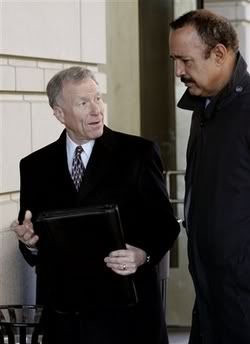
Before opening statements on Tuesday, there had been some questions about the fact that Prosecutor Fitzgerald was given one hour, while Libby’s lead attorney, Ted Wells, got two hours.
The reason was probably pretty basic: Fitzgerald has a simple case. Remember his baseball analogy during the indictment press conference. Fitzgerald was the umpire trying to see what was happening in the game, and Libby threw dust in his eyes. Thus, his case is simple. Here is the dust. Here is the evidence that Libby threw it.
Wells’ task, on the other hand, is much broader and more complicated. He is trying to say a number of things that will confuse the situation for the jury.
a) Scooter doesn’t remember having dust in his hand.
b) Scooter is an honest, hard working guy who was pushed into a dust cloud to protect someone else.
c) Scooter was so preoccupied with all the complicated things going on in the dugout and in the clubhouse that he didn’t have time to worry about what the umpire was seeing, so why would he throw dust?
All of those arguments take time to set up. Fitzgerald can show the jury a crystal clear glass of water, while Wells has to bring out a bag of dirt, dump it in the water, stir vigorously, and then keep stirring throughout the trial in order to make sure nothing settles.
But this all plays into Fitzgerald’s hands, for a number of reasons:
- Throughout the trial, Fitzgerald will be seen by the jury as the guy who is trying to help them see things clearly, while Wells will always be the guy trying to confuse them.
- Fitzgerald’s simple case, based solely on Libby’s lies, has seemed to cause Libby to grow more resentful of feeling like a scapegoat, making him more likely to point fingers and incriminate others as a part of his defense.
- Fitzgerald has every reason to know what was really going on in the dugout and in the clubhouse, so as Wells trots out all the other “players,” along with the “Manager” (Dick Cheney), to establish what Scooter was so preoccupied with, Fitzgerald will have the opportunity to grill them about what else Scooter, and they, may have been preoccupied with.
When the dust settles, I suspect that Fitzgerald will have more than just enough evidence to show that Scooter threw dust in his eyes. He will be able to show who was doing steroids in the clubhouse, and whether the Manager was coaching his team to slide into home plate with cleats up in order to hurt any opponents of the Bush Administration!
Emptywheel’s summary of Fitzgerald’s opening statement
Emptywheel’s summary of Wells’ opening statement - Part 1, Part 2
MSNBC’s Wrap up.

No comments:
Post a Comment